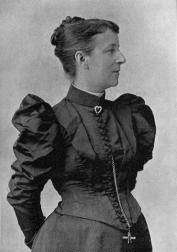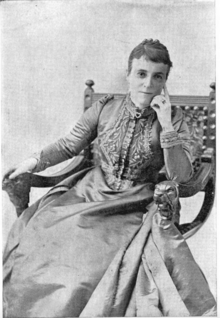Laura Ormiston Chant
Laura Ormiston Dibbin Chant (9 October 1848 – 16 February 1923, Banbury) was an English social reformer and writer.

Biography
Chant was born on 9 October 1848, in Woollaston, Gloucestershire, the daughter of Francis William Dibbin (1811–1874),[1] a civil engineer and Sophia Ormiston (1815–1894), who managed a girls institution. Her parents were highly disciplinary and she ran away from home aged fifteen. She worked as a nursing sister in the Sophia Wards in the London Hospital. Working as a nurse, considered a rough occupation at the time, her father banned her from ever returning home. At work she met and later married Thomas Chant, M.R.C.S., L.S.A., of Bridgwater in 1877.[2][3] They had Thomas, Emmeline, Olive and Ethel Chant.

Ormiston wrote and lectured on social purity, temperance, and women's rights.[4] Her published works include pamphlets, hymns, a novel and a book of poetry and are described as reflecting "many of the tensions characterizing feminism of the late nineteenth and early twentieth centuries".[4] She also wrote the words and music for Action Songs for Children and several more volumes of music in the same vein, consisting of simple ditties embodying physical exercises for small children. In 1893 Chant addressed the 1893 Parliament of the World's Religions, held in Chicago in conjunction with the Columbian Exposition. Her subject was Duty of God to Man Inquired.[5] In 1894 she started attacking music-halls as temptations to vice.[6] She went to Bulgaria to give aid to Armenian refugees from the 1894–1896 Hamidian massacres.[7][8]
Chant died in Banbury, Oxfordshire, 16 February 1923.[4]
Selected works
- Verona and Other Poems (1877)
- Why We Attacked the Empire (1894)
- Women and the Streets
See also
References
- ORMISTON, T.L., The Ormistons of Teviotdale (1950), p.70, gives her father's name as Dibbin. So does her Times obituary, 17 February 1923
- "Hymntime: Laura Ormiston Dibdin Chant". hymntime.com. Retrieved 2018-10-26.
- Her Times obituary gives the year of her marriage as 1876.
- "Laura Ormiston Chant © Orlando Project". orlando.cambridge.org. Retrieved 2018-10-26.
- "Duty of God to Man Inquired". womenshistory.about.com. Retrieved 2018-10-26.
- 'Death of Mrs. Ormiston Chant: A notable social worker', The Times, 17 February 1923, p. 12
- "CHANT, Laura Ormiston Dibbin". The Encyclopedia Americana. vol. 6. 1918. p. 291.
- "CHANT, Mrs. Laura Ormiston". Who's Who,. vol. 59. 1907. p. 318.
Churchill, Winston S., My Early Life, 65-66, discussing Ms. Chant's campaign to close the Empire Theater in London
External links
| Wikimedia Commons has media related to Laura Ormiston Chant. |